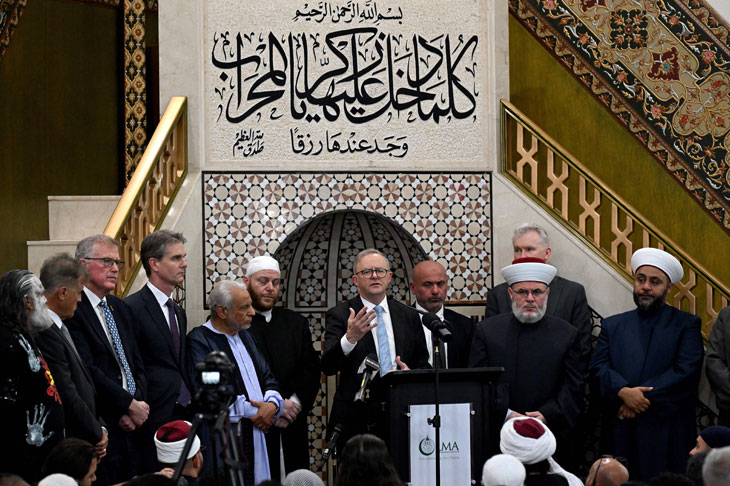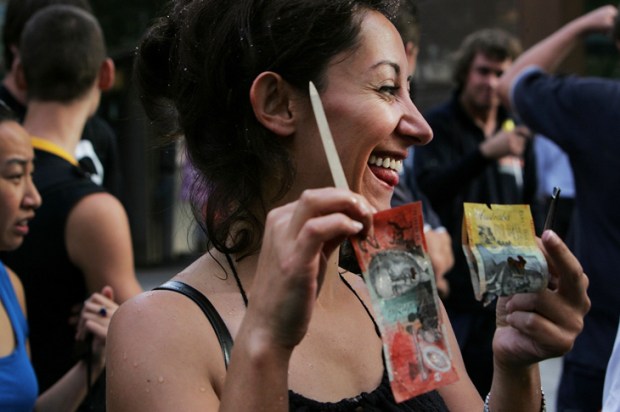With the Hamas atrocities exposing a deep social divide across the West, everyone suddenly sees the problem with multiculturalism. Increasingly the ‘D’ word, deportation, is on politicians’ lips, from Germany to the Nordic countries to the US. Decades of multiculturalism and mass migration have laid the tinder, with the Hamas-Israeli flashpoint now fuelling civic protests and violence across the globe.
The long-held Western assumption that all of the globe’s different cultures can live together amiably may turn out to have been naive, if one group continues to deny another group basic human rights – such as existence.
Multiculturalism was always predicated on a core loyalty to basic values, such as freedom of speech, tolerance, equal opportunity, democracy and the rule of law. It has worked for a long time, with many proud to boast that Australia was one of the world’s most successful multicultural societies. Indeed, around one in three Aussies is born overseas, and yet we remain remarkably peaceful.
However, the Western world, and the Australia into which multiculturalism was introduced in 1978 was very different from now. After World War II Southern and Eastern Europeans emigrated en masse to Australia and North America, boosting post-war prosperity. I grew up among them in Victoria’s Latrobe Valley, where I had Maltese neighbours on one side, Russians the other and Ukrainians, Estonians and Latvians over the road. Native-born Australians were a rarity and cultural diversity the norm. Then the Wall fell, the Cold War ended and liberal democracy’s dominance was such that US academic Francis Fukuyama could write an influential book arguing that ideology was over and we had arrived at the end of history. The West seemed strong and victorious.
Now we are entering a multipolar world, with a weakened USA, and an aggressive, still-communist China and other rivals challenging Western hegemony. We face the recurring spectre of Islamic terrorism and massive refugee flows, even as our societies fragment and splinter with identity politics. Culture itself is becoming more important than ever, with race, religion, skin colour and ‘diversity’ new markers of social status. The Voice campaign exposed a bitter indigenous separatism. Our societies are no longer as unified as they once were, in a world that has become more threatening.
Academics such as Robert Putnam have long argued that multiple ethnicities decrease social trust, forcing a retreat from the public space into tribes. This was supported in 2020 by a Copenhagen University meta-analysis of 87 studies which found ‘a statistically significant negative relationship between ethnic diversity and social trust across all studies’. This is, in other words, Balkanisation, a society of tribes.
Bipartisanship has for decades muted any criticism of multiculturalism, and many are the politicans who followed in Enoch Powell’s path and were flayed for doubting some cultures’ adaptability to Western values. Eminent voices are now being raised, however, as doors are closing all across Europe. Elder statesman Henry Kissinger lashed Germany’s ‘grave mistake’ of letting in ‘so many people of totally different culture and religion and concepts’. Former UK Home Secretary Suella Braverman, herself of Indian descent, labelled multiculturalism a failure. German Chancellor Olaf Scholz has vowed to toughen migration laws and increase ‘large-scale’ deportations. Crime-hit Sweden’s Prime Minister recently denounced the country’s ‘irresponsible immigration policy and failed integration’. Hungary’s Orbán has predicted that the next European elections would focus on migration and terrorism. Five Nordic nations agreed in October to collaborate on tighter migration controls, including paying migrants to go home.
These issues are arising as the Albanese government is bringing in an extraordinary flood of migrants – a new Canberra every year – when infrastructure, particularly housing, is already failing our young people, especially in our capital cities. Moreover, a recent Australian High Court decision has upset the indefinite detention apple-cart, its decision leading to the release of both a child-sex offender and a Malaysian contract killer into our communities – on the grounds that no one else would take them in.
Meanwhile, it sometimes feels as if, in a world where culture is increasingly significant, the only culture that is not respected is the host Judaeo-Christian one. Just as anti-white racism is dismissed in some quarters as a definitional impossibility, since whites are the colonising oppressors, so the traditions of Western host nations can be disrespected. Did London’s big pro-Palestine march have to be on Remembrance Day? Did pro-Palestinian slogans have to desecrate Melbourne war memorials, of all places? Did the Caulfield protesters have to choose a synagogue to assemble outside? Where is any respect? My daughter, in her twenties, was recently surprised to be asked what her ‘ethno’ was – as if everyone automatically came from elsewhere. I have a niece who has relocated to Italy because ‘Australia has no culture’.
The question is, can the West’s multiculturalism survive the conflict with radical Islamists? Or is it out of date, a policy for a different era? These radicals don’t accept Australian values, instead preaching jihad and displaying contempt for our laws. Supporters of the status quo would argue this is simply the difference between terrorists and otherwise peaceful Muslims, and leave multiculturalism out of it please.
But a more basic cleft between Judaeo-Christian values and Islamic ones may be emerging. Pundit Douglas Murray recently pointed out that Nazi soldiers had to get drunk to deal with the horrors of the gas chambers they administered. Hamas fighters, by contrast, rang home to celebrate, gleeful at how many Jews they had killed. Donald Trump Jnr recently shared a video of a German Islamist asserting that as soon as they outnumbered the locals, Sharia law would come in. ‘Once Muslims are in the majority, it is our duty to conquer Germany’. He then cited taqiya, the doctrine of lying in a pious cause, when asked if ‘normal’ Islam agreed with such approaches. Most Muslims in the West have been peaceful, but judging from the 300,000-strong pro-Palestinian march in London, the radical fringe is not tiny. And it has few qualms about asserting itself.
Ayaan Hirsi Ali recently argued that radical Islam provides a civilisational challenge to the Judaeo-Christian West. It’s past time to focus on what unites us rather than what divides us, a debate that I fear terrorism will force upon us.
Got something to add? Join the discussion and comment below.
Get 10 issues for just $10
Subscribe to The Spectator Australia today for the next 10 magazine issues, plus full online access, for just $10.
You might disagree with half of it, but you’ll enjoy reading all of it. Try your first month for free, then just $2 a week for the remainder of your first year.














Comments
Don't miss out
Join the conversation with other Spectator Australia readers. Subscribe to leave a comment.
SUBSCRIBEAlready a subscriber? Log in